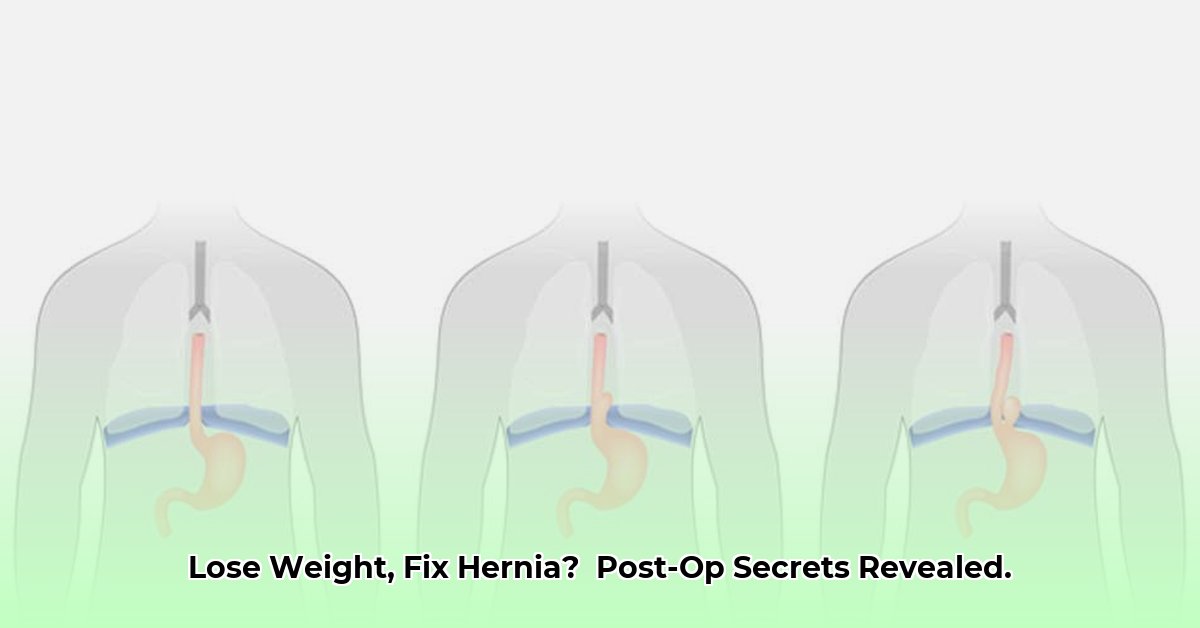
Navigating the period after hiatal hernia surgery can be challenging, especially regarding weight changes. This guide offers clear, actionable advice to help you manage your weight and ensure a healthy recovery.
Understanding Your Post-Surgery Weight
Weight changes are common after hiatal hernia surgery. Several factors contribute:
- Dietary Restrictions: Your doctor will likely start you on a liquid or soft food diet to aid healing. This naturally reduces calorie intake.
- Altered Stomach Capacity: The surgery might alter your stomach's size, leading to faster satiety (feeling full) and smaller portions.
- Appetite Changes: Some patients report decreased appetite post-surgery.
These combined factors often result in weight loss, which is usually positive for overall health.
What Kind of Weight Loss Should I Expect?
The amount of weight loss varies greatly. Moderate weight loss is typical. However, rapid weight loss (more than 2 pounds per week) warrants immediate medical attention. Your doctor can determine whether this is normal or indicative of a problem. Remember, proper nutrition is crucial for healing.
Taking Charge: Managing Your Weight After Surgery
A successful approach involves three key areas:
Nutrition: Your doctor or a registered dietitian will provide a tailored dietary plan, crucial for recovery and preventing complications. Follow it carefully!
Hydration: Drink plenty of fluids, especially water. Dehydration is a common risk; dark urine is a warning sign.
Exercise: Begin with gentle activity as your doctor approves. This aids weight management and overall healing. Start slowly and gradually increase intensity.
Potential Challenges and How to Address Them
While generally safe, potential complications include:
| Risk Factor | Likelihood | Severity | Management |
|---|---|---|---|
| Rapid Weight Loss | Moderate | High | Contact your doctor immediately; adjust diet; consider nutritional supplements. |
| Malnutrition | Low | High | Close dietary monitoring; consult a registered dietitian; consider supplements. |
| Dehydration | Low | Moderate | Drink plenty of fluids; monitor urine color; contact your doctor if concerned. |
Remember, rapid weight loss, malnutrition, or dehydration require immediate medical attention. Early intervention is key.
Long-Term Weight Management: A Lifestyle Change
Sustained weight management involves:
- Balanced Diet: Consume a variety of nutrient-rich foods.
- Regular Exercise: Aim for at least 30 minutes of moderate-intensity exercise most days.
- Ongoing Support: Utilize your healthcare team and support networks for guidance and encouragement.
Maintaining a healthy weight after surgery is a long-term commitment. Focus on creating sustainable lifestyle habits.
How to Manage Rapid Weight Loss After Hiatal Hernia Surgery
Rapid weight loss can be concerning. Here's how to manage it:
- Dietary Adherence: Strictly follow your prescribed diet.
- Hydration: Drink ample fluids to prevent dehydration.
- Gradual Food Introduction: Slowly add solid foods as instructed.
- Regular Weigh-Ins: Monitor your weight and report significant changes to your doctor.
- Nutritional Guidance: Consult a registered dietitian for personalized support.
- Listen to Your Body: Pay attention to hunger and fullness cues.
- Gradual Exercise: Increase physical activity gradually, as approved by your doctor.
Addressing potential complications such as fatigue, dizziness, or muscle weakness requires immediate medical attention.
Key Takeaways
- Post-surgical weight loss is normal, but rapid weight loss needs immediate attention.
- Dietary changes, stomach capacity changes, and sometimes bariatric procedures affect weight.
- Monitoring your weight, following dietary guidelines, and regular communication with your surgical team are crucial.
- Healthy lifestyle changes are fundamental for long-term weight management. You are not alone in this journey! Your healthcare team is here to support you.